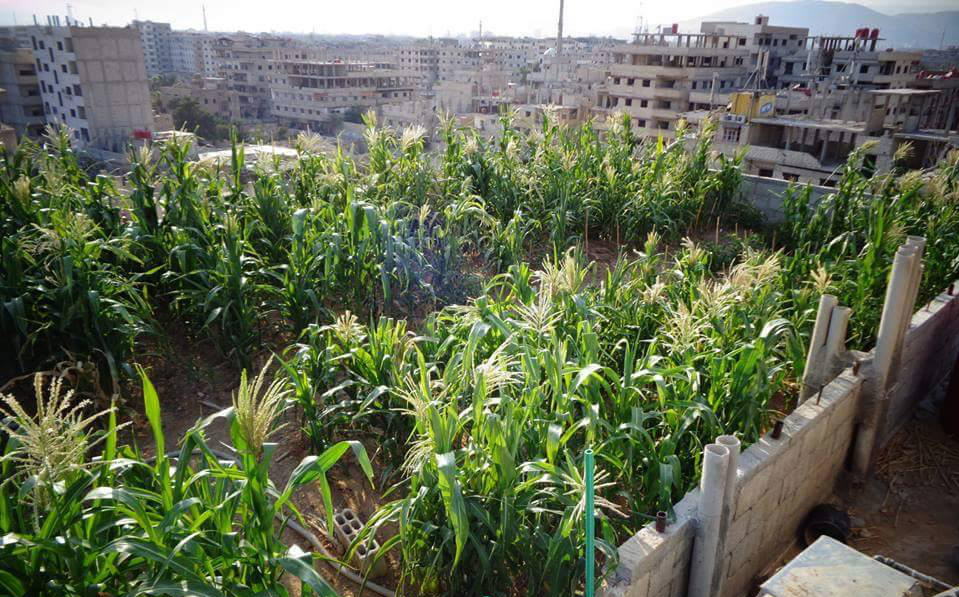Transcribed from the 16 June 2018 episode of This is Hell! Radio (Chicago) and printed with permission. Edited for space and readability. Listen to the whole interview (starting at 3:18:00):
Right now we have about eight men controlling more wealth than half of the global population, and we’re moving in a direction where that’s going to be reduced to four, and then it’s going to be two. This inequality—the injustice, the unfairness of it—is something that almost no sane-thinking person would subscribe to.
Chuck Mertz: Globalization, as in the global economic system, is fueling the rise of a far-right authoritarianism and breeding hate in an age of uncertainty, insecurity, and precarity. But our next guest sees a way out. Here to tell us that there is an alternative, award-winning New Economy Movement pioneer Helena Norberg-Hodge wrote the article “Localization: A Strategic Solution to Globalized Authoritarianism,” which was posted at the transnational institute’s website. Helena is a recipient of the alternative Nobel prize and the author of the 2009 book Ancient Futures: Lessons from Ladakh for a Globalizing World. She’s also producer of the award-winning documentary The Economics of Happiness.
Welcome to This is Hell!, Helena.
Helena Norberg-Hodge: Thank you, very glad to be here.
CM: You write, “For those who care about peace, equality, and the future of the planet, the global political swing to the right over the past few years is deeply worrying. From my forty years of experience working in both industrialized and land-based cultures, I believe the primary reason is globalization. When I say globalization, I mean the global economic system in which most of us now live, a system driven by continual corporate deregulation and shaped by neoliberal capitalist ideologies.”
Can globalization, which has bipartisan support here in the United States and is seen as an inevitable given of modern society, happen without being shaped by neoliberal capitalist ideologies? Can we have global trade but without the problems you see caused by globalization?
HN: We certainly could have global trade, but what we need to look at is the “freedom” that we’re giving to global traders, including financial institutions and banks. Ever since the Second World War we’ve had a series of trade treaties that essentially give global corporations more and more freedom. Today that freedom means they are forcing governments to sign, in the new trade treaties, what are called “investor-state dispute settlement” [ISDS] clauses. Governments are writing, in black and white, “We will not do anything that might reduce your profit-making potential. If we do, you can take us to court.”
This is why most governments are now rolling back and completely reversing both labor and environmental protections that had been brought in through the hard work of countless numbers of people and organizations. They are blindly going along with so-called “free trade,” which is not actually free trade. It’s forced trade. It’s senseless trade. It includes importing and exporting the same products. From water to toxic waste, countries are importing and exporting the same thing. The US imports about a billion pounds of beef, and turns around and exports about a billion pounds of beef. Why? Because if we ate our own food in most countries, no multinationals would make money and instead, literally hundreds of thousands of farmers as well as medium-sized and smaller businesses would make money.
CM: You were saying this is not “free trade.” And it would seem like the idea of exporting tons of beef while importing tons of beef shouldn’t make sense in a free market, that there would be no profit in that. So how is this not a free market? And what makes it profitable to export meat or any other product and then be importing the exact same product?
HN: Remember we’re talking about profitable for whom. When we’re talking about giant multinational corporations, their profit may be tiny for each product, but this is essentially all about control. This is a consequence of our governments supporting global trade and supporting global traders; that includes laying out a red carpet in the form of infrastructure that suits the needs of the global players; it includes allowing those global traders to be so mobile and so clever that they pay virtually no tax. There is a two-tiered system, a type of feudalism, where a few giants pay no tax and have no regulation. Meanwhile—and this is one of the main reasons for the rise in authoritarianism that’s so frightening—small businesses around the world are feeling more and more frustrated by government bureaucracy and red tape. They’re strangled by regulation. They’re taxed very heavily. So their solution is “no government,” in other words laissez-faire free-trade liberal economics. Because all they see is the big hand of government. They don’t realize that behind that hand of government is the much bigger hand of giant businesses.
If we could get this message out, we could get a very rapid shift towards preventing this completely skewed and unfair system from benefiting the few at the expense of the many. No self-respecting capitalist believes in subsidies or in monopolies, and yet that’s what we have. We are subsidizing global monopolies and punishing the ninety percent.
CM: Why do you think it is so much more attractive, apparently, to blame the government than to blame businesses? One of the things we hear in the States is, “If only government were run like a business.” It is being run by business already. So why is it that we cannot see the hand of business behind whatever government bureaucracy is being forced on small business?
HN: Because the seeing is done through corporate eyes. Worldwide, even in my native country of Sweden, virtually every avenue of knowledge is being colonized by big business: the media (even a lot of what we get online, as we now see), science, education. You would not believe how much schoolbooks and university curricula have changed to favor the blind fundamentalist mantra about free trade, while silencing the real issue of monopolistic control. So we very rarely get a clear, holistic picture of what’s going on globally, and the average person just sees the hand of government with its huge bureaucracy. Bureaucracy of all kinds is only growing, especially now with so much online. As a doctor you’re spending more of your time looking at your computer and writing up notes than you are looking at your patients. Teachers and professors are spending so much time looking at the computer and reporting back to higher authorities that they can’t deal with their students. It’s been a very rapid progression into what we really need to describe as a type of neo-fuedalism.
It’s amazingly inspiring to see how farmers and consumers and middlemen have come together to create new food initiatives from the bottom up. And they’re doing it against the tide. All the information, the taxes, the subsidies, the pressure—it’s all there to make it difficult for them.
I’m so grateful to you: community radio is one of the most important tools we have to reach more people with the message of common sense. It’s not about a communist alternative—it’s not even a “socialist” alternative we are talking about. We are talking about fairness. We are talking about ending these hidden subsidies. Right now we have about eight men controlling more wealth than half of the global population, and we’re moving in a direction where that’s going to be reduced to four, and then it’s going to be two. This inequality—the injustice, the unfairness of it—is something that almost no sane-thinking person would subscribe to.
But we now have evidence of what happens when people come together at the local level to support their local businesses. This is not some kind of isolationism or racism (as it’s portrayed by the media). This is local people coming together to collaborate and support smaller and medium-sized businesses, and we’re seeing wonderful results. We have evidence that allowing smaller-scale businesses to survive is beneficial not only in terms of secure livelihoods and more genuinely democratic and accountable structures, but it also heals political, racial, and social divides.
That is vitally important information, which we need to use community media and every other sort of socially accountable media to spread.
CM: We consume so much media, you’d think we’d be good at it. What explains our susceptibility to business propaganda?
You write, “Some studies have shown that every new supermarket in the UK entails a net loss of 276 jobs. The online marketer Amazon has destroyed 150,000 more jobs than it has created, according to a report from the Institute for Local Self-Reliance. Like other online retailers, Amazon has not only benefited from communications and transport infrastructures built at public expense, it has avoided collecting state and local sales taxes from its customers—sales tax revenues that states and localities desperately need—giving Amazon a price advantage of as much as 9.75% over Main Street businesses.”
We recently spoke with Stacy Mitchell of the Institute for Local Self-Reliance about Amazon’s unfair advantages, how it has been built on public money and resources, how it is arguably a monopoly, how it is bad for workers and local employment. Yet, even those who are aware of this continue to use Amazon, and cities around the country are fighting for the newest Amazon headquarters.
What explains why cities are clamoring for a company like Amazon to come in, since, as you and Stacy have pointed out, they haven’t proven to be good for cities or workers? This week Elon Musk said he’s going to put in high-speed rail for rich people going from downtown to our airport here in Chicago, and the TV news anchors on our local stations are all excited—big smiles and hand-clapping all over.
Why is it that we cannot see that this is business propaganda?
HN: From my point of view, it’s not strange. It’s because people so rarely hear a holistic, sensible argument that explains to them what’s really going on. We have not realized how much propaganda there has been for the tech world and giant online companies. Most people on the left, even most environmentalists, have seen it as beneficial. It’s only very recently that people have started questioning it, as some of the worst abuse has become clear.
More and more people are struggling to pay the mortgage and just survive, and they have less and less time. When things are offered to them, like an Amazon product where there is no tax and it looks a bit cheaper, you can’t really blame people for opting for that. When we’re just presented with “Are you going to buy this Amazon product—which is going to cost you a little bit less and you’re going to get it faster—or not?” it’s just a market choice in a rat race where people are running faster and faster. We’re not going to make headway.
The greatest need today is what I call “big-picture activism,” in other words, activism now is really about people’s minds. It’s about really understanding what’s going on, and it’s about moving away from saying to people, “Buy the more expensive product, that’s how we’re going to save the planet.” The idea that we’re going to change things through the market is a corporate idea. We can change it through policy, and we can also change it through community-connected coming together, through localization. There’s a lot we can do. Through very pragmatic and simple policy changes, we can start shifting the direction of our governments. When we put the big picture together, the poor and the marginalized—and the planet—will all benefit from the economic shift. That picture is just not out there widely enough.
CM: Why is the right seemingly better at exploiting precarity and insecurity than the left? Why is blaming others apparently more successful? Why does hate—rather than us all working together to address the problem—seem to work?
HN: Our governments, for far too long, have allowed GDP to be used to measure progress. GDP goes up with breakdown. All it measures is money exchange—in other words, commercialization. Commercialization increases with breakdown. If you have a very strong community and many friends and family, you don’t need to pay for a caretaker to take your grandmother to the shop. If you have a functioning, strong community, you don’t need to pay an escort to go with you to a concert or something. If you have a functioning, healthy economy, you do not call it progress when all the water is so polluted that people have to buy it in bottles.
This is a basic foundation very deep in our dominant economic system that needs to be changed. Not by suddenly overnight shutting down every big corporation and ending all global trade, or thinking that everybody in a corporation must be a bad person, and everyone in a small local business is a good person. It’s not like that. The basic mechanisms of our the system that surrounds us—the way that it’s measured (GDP), what we tax and what we don’t, what governments subsidize with those taxes, what governments regulate and what they deregulate—those mechanisms need to be shifted. By shifting those mechanisms we could have a peaceful path whereby we start shrinking the power of these global monopolies, and start using our taxes and our collective finances to support genuinely healthy, diversified production. In practical terms, it is not nearly as difficult as people think to start shifting direction. What’s needed is that bigger picture to see it.
We’re talking about a way forward that is not feeding into old-time nationalism, which has always been linked to war. Nationalism is generally not healthy. What is healthy is a sense of community and a sense of identity that is not linked to a nation-state that’s going to make itself great at the expense of other countries and other people and is usually linked to a war machine.
The localization movement is particularly important around food. In food and farming, we have had policy for literally centuries that marginalizes and destroys small farmers. They have to struggle. They’ve been encouraged to buy more and more machinery, go into debt, and then either merge and become part of a bigger conglomerate or die. That path is being reversed from the grassroots. It’s a very small movement, but it is a rapidly growing movement, and it is worldwide.
When we support smaller diversified farms we are supporting farming that reduces CO² emissions, that heals the soil, that is actually healing the environment while it increases productivity. This is a fundamental truth that is being recognized now even at the level of the UN. But again, it’s not getting out. The myth we’ve had all these years, all these generations, is that we need big farms to feed the global population. That is a myth.
Fundamental to the localization movement is the globally-growing local food movement. That’s where you can get a basic lesson in a really sane new economic perspective. Of course, not everything is about food, but food is the only thing we produce as human beings that every single person on the planet needs every day of their lives. For me it’s amazingly inspiring to see how farmers and consumers and middlemen have come together to create new food initiatives from the bottom up. They’re doing it against the tide. All the information, the taxes, the subsidies, the pressure—it’s all there to make it difficult for them (this is also why it’s still not flourishing as much as it should). But you’d be surprised how much the prices of really healthy foods can come down within these local initiatives, and just how many projects there are (in Denver and many other cities where people are starting to reclaim knowledge about how to grow food)—and how many problems it heals in terms of anger and violence. There are projects with prisoners who, when they start gardening and growing food, literally turn their lives around in a matter of months.
I don’t want to wax too lyrical about it. But I do love this movement, and I know the farmer who started the first CSA in Beijing, and I’ve worked with farmers in South Korea and Italy and Africa. We’re a very small organization but very, very grassroots, and I suppose the best thing about that is that it does help one regain a sense that human beings really want to do the right thing. Human beings, even angry prisoners, thrive when they are given the opportunity to do something different.
CM: How much is the localization movement about getting prices more in line with reality? As you point out, small farmers have to spend a lot more money to make their product because they are being regulated and restricted and limited by rules that don’t apply to large agribusiness outfits; it’s a far greater capital output for a small farmer than it is for a large farmer.
How much is the localization movement about making prices more in line with the market? How much is it about being more free-market and capitalist than the present system actually is?
HN: This is very interesting. In a sense what we’re talking about here is two markets. We’ve got this one essentially global market which is being shaped by these global trade treaties, and it has become more and more globalized and supported by bigger and bigger and more global banks. But in the meanwhile we are starting to link up farmers and consumers more directly.
(It doesn’t always have to be local-local. Local is a relative term. Sometimes it is just a direct relationship between a group of farmers and a group of consumers, maybe even in a different country. But it’s a direct relationship; it’s more human-scale, there’s more direct knowledge. Best of all is when we can shorten distances, because that reduces the need for packaging and all kinds of other things that are not only more expensive but very counterproductive. The mountains of plastic we’re facing now are primarily a consequence of this globalized system).
What we’re doing is actually creating a different market. This is the big difference. Instead of asking people in the dominant global market to buy the more expensive product and not buy the cheap thing from Amazon, here we’re setting up a new market where they can actually buy things at quite a reasonable price, and above all, the producers and the shop can thrive. With more localized systems there’s a remarkable benefit effect, because when you buy from these local farmers, they spend money in the local economy, and there’s a multiplier effect which benefits more people, many more jobs. When there are these multiple benefits, more collaborations begin to emerge between more people. That’s better than being trapped in this big system, just fighting to survive, fighting each other instead of this enormous economic hand that we don’t even understand or know about.
I know a lot of people have given up on political change, and I can understand why. I want to say I really don’t think the answer lies in trying to focus on one new savior. It’s really about more people having greater economic literacy in order to be more politically savvy. We are not going to have democracy if we do not deal with this economic juggernaut.
CM: One of the things that we hear here in the US is that the West has done so much for the developing world, they have given so much, they’ve spent so much money in foreign aid to help out the developing world. We see the media and government constantly blaming religious extremism for terrorism, but you saw Buddhist and Muslim populations in Ladakh who had lived next door to each other in one solid community for centuries and centuries have this destroyed by development.
How much has unfair development imposed by the West led not only to militant extremism, but terrorism? Is development in the global economic system “why they hate us”?
There’s a grassroots movement growing, and there’s plenty of time for all those who are still depending on the other system to start making adjustments.
HN: I feel really sorry for the “average Westerner” who is made to feel it’s their fault that all of this is happening. Yes, it is true, it came from the West. But as I see it, we have to understand that from the very beginning, we’re talking about global traders. When that all started—with slavery and colonialism—those traders were not very nice people. They had values that are abhorrent to most people. They were literally hunting Native people. There was genocide. There was slavery. There was imprisonment of people who didn’t go along with the creation of a “global economy.” People in so-called “Third World” countries, which is another way of saying colonies, were forced away from producing a range of things for themselves, and towards producing commodities for the global traders, for the global market. Whole regions suddenly became “cotton regions” or “tea regions,” or “tin mining regions.” That was all through force. And although later on these colonies became liberated, they didn’t become financially liberated.
Right now if we talk about the incredible impoverishment and divisiveness that’s growing in the so-called Third World, we really have to make it clear that the average Westerner has nothing to do with it. We have not been asked whether our taxes should be used essentially to create more wealth for the very wealthy elites—both Western elites and “Third World” elites. Chinese billionaires. Filipino billionaires. African billionaires. It’s a system that is marginalizing more than 99% of humanity. In the meanwhile let’s not make it seem as though the average Westerner struggling to pay their mortgage has anything to do with that—except, unconsciously and sometimes through very good will, by promoting what they thought was aid, what they thought was development, what they thought was a good thing.
There have been many non-governmental organizations raising money for a type of development that was actually destroying local economies and destroying local self-respect. In some cases there is now, thank goodness, a deeper dialogue—really what it comes down to is that every community can benefit by getting away from the dependence on global corporations and starting to build their own local economy.
But the link of development to really frightening ethnic and racial divides, and to terrorism, is very, very clear in our experience. It is marginalizing people, and the marginalization of men in particular should not be ignored. The system does this in a dual way: it comes in with images of who you should be. All around the world (it doesn’t matter where you live, in Appalachia or in Kenya or in China) the image is essentially a white consumer image: you should be filthy rich, glamorous, have the fancy car, live the urban consumer lifestyle, otherwise you’re nobody. At the same time, people’s livelihoods are more insecure. So there is this overpowering image which makes you feel like nobody if you don’t have all this stuff, and at the same time there is a system which is destroying millions of small farms and jobs and livelihoods. People are getting impoverished.
When you do that to men, you take away their psychological self-respect and their financial security, and their ability to provide for themselves and their families. That’s a recipe for violence. The immediate thing is to turn against the immediate other, and this is why now in the West there is such anger against immigrants who are seen as the ones taking all this away. In the same way, I saw not just in Ladakh but also in Bhutan Hindus and Buddhists who had lived side by side for generations, after about two decades of this system coming in, suddenly killing each other. It’s happening in Burma now with the Rohingya. And it’s happened in many other places after the colonial powers left—they had set up this highly competitive, very destructive economy, and suddenly different groups were at each other’s throats.
CM: But here in the States, Helena, we have a rightwing leader who has come to power partly due to his criticism of globalization. How can someone like Trump both be an outcome of globalization and a critic of it? Why would he try to undermine the system from which he and his power were created?
HN: We’re dealing with someone who’s very juvenile and very narcissistic. He’s coming in on the belief that he’s going to make America great—and that, in his mind, means making himself great, and his businesses wealthier and greater. It is very disturbing for many of us, because he makes many people believe that if he’s against these trade treaties, then they must be a good thing. But again, we have to sit down and really look at what’s going on here. This is not a man who is going to genuinely support flourishing smaller and medium-sized businesses. This is a man who is out to get a deal. He made clear just now that he wants to build Trump hotels in North Korea.
I just hope that people will look at these issues and think for themselves. We’re talking about a way forward that is not feeding into old-time nationalism, which has always been linked to war. Nationalism is generally not healthy. What is healthy is a sense of community and a sense of identity that is not linked to a nation-state that’s going to make itself great at the expense of other countries and other people and is usually linked to a war machine.
We’re dealing with a very difficult situation, and we’re not just talking about America. The UK routinely exports as much milk and butter as it turns around and imports. Does anyone talk about that when they talk about climate change? No. Because this is what’s supporting the global corporations at the expense of literally millions of smaller businesses and farmers. Do people know that supermarkets routinely will fly apples to the UK from South Africa to be washed, and then they’re flown back again? Norway flies fish to China to be de-boned and then flies it back. We are talking about the most outrageous waste, and a major cause of climate change.
And what’s happened because of corporate-funded propaganda? Pointing the finger at poor individuals who are just struggling to survive. “You’re driving your car! You’re going on holiday in an airplane! If you’re an environmental activist, and you’re traveling, how dare you! In this era of climate change, you should stay home. You should never fly, you should never drive a car.” In the meantime, this major part of climate change is not being discussed. The scary thing is that gaps between racial groups, between genders, between immigrants and insiders—all of these social divisions are also being played up hugely in the media, and the areas where we could actually come together for meaningful change are not getting out.
CM: You write, “An elitism charge against people who are for localization is that the Northerners working to localize their economies are turning their backs on the impoverished people of the Global South who need Northern markets to pull themselves out of poverty.”
What would happen to developing economies if suddenly the US wasn’t the world’s leading consumer anymore? What would happen if the nation that, as of 2015, consumes a whopping 29% of the world market (with Japan coming in second at only slightly over 8.5% of the market), suddenly stopped consuming the goods of the Global South?
HN: This is how it’s presented, as some kind of boycott. Like overnight, we’re not going to buy any more stuff, from one day to the next—totally impossible! What we’re talking about here is a transition. There would be plenty of time for the producers who right now are producing things for us and not for themselves to make that shift in production. This is not possible as some kind of boycott. It’s not going to be snapping our fingers and suddenly we’re producing everything we need. It’s going to be a policy choice, it’s going to be a movement, as it is now. There’s a grassroots movement growing, and there’s plenty of time for all those who are still depending on the other system to start making adjustments.
CM: Helena, I really appreciate you being on the show this week.
HN: Thanks so much.
Featured image: Rooftop community garden in Damascus. Source: Nachbarschaftsakademie





